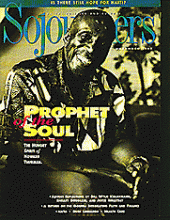"Having said these things, Jesus went out with his disciples." The farewell discourse over, all that remains in the fourth gospel is for Jesus to complete his demonstration of love for both his disciples and the world. The final chapters of John put everyone and everything on trial: the krisis—Greek for "judgment"—can no longer be avoided.
The Johannine Jesus takes the journey to the cross with royal calm. Indeed, the narrator describes Jesus "going forth" to meet the band of soldiers and temple police sent by the conspirators to capture him (18:4). The narrative is thickly ironic: The arresting party is said to be carrying "torches and lamps" as they go to meet the one who is the Light of the world!
The first one put on trial in this series of judgments is Judas, who we have been warned repeatedly would be Jesus' betrayer. While Jesus is surrounded by the police and soldiers, the text surrounds Judas with God's presence, but leaves him "standing with them," that is, the arresting band (18:5). The presence of God is focused through Jesus' divine declaration in 18:5, "I am"—ego eimi, the response of God to Moses at the burning bush that has echoed throughout John's gospel. When the narrator quotes Jesus' statement in the next verse, repeating the sacred "ego eimi," Judas is left with no escape route.
Read the Full Article

